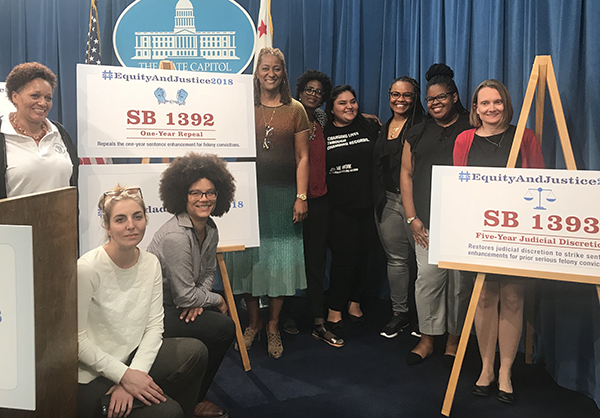News
Bill Passes Senate Allowing Judges to Strike Sentence Enhancement for Prior Convictions

The California Senate recently passed Senate Bill 1393, the Fair and Just Sentencing Reform Act, which reinstates judicial discretion to the application of the five-year sentence enhancement for each prior serious felony on a person’s record at the time when a person is currently charged with a serious felony.
The bill, which passed with a vote of 23 to 14, is part of the Equity and Justice Package of 2018 authored by Senators Holly Mitchell and Ricardo Lara that seeks justice reforms for juveniles and adults.
“Mass incarceration is a massive moral failure and policy failure. It’s a moral failure because we now know that it is injurious to families and to the economies of low-income
communities, and that its violence has been directed overwhelmingly at Black men and Black women, Latinos and Latinas,” Mitchell said.
“As a matter of public policy, paying for long prison sentences is the worst use of public safety dollars. We must stop wasting taxpayer dollars on a failed policy.”
California has some of the most severe sentence enhancements for prior convictions in the nation. According to the Public Policy Institute of California, “California has more than 100 separate code sections that enhance sentences” based on a person’s current offense and/or record of prior convictions.
As of 2016, 79 percent of people under California Department of Corrections and Rehabilitation custody had some kind of sentence enhancement attached to their base sentence; 25 percent had three or more enhancements stacked on.
Communities of color have been the most severely impacted by the application of these punitive policies. According to data from CDCR, there are close to 100,000 years’ worth of the 5-year enhancement applied to people currently under CDCR custody.
The Fair and Just Sentencing Reform bill would help restore balance in the judicial process, address extreme sentences, and reduce racial disparities in the criminal justice system by allowing judges to decide what is best in the interest of justice.
“The financial and emotional stress of having a loved one in prison is extremely difficult, and sentence enhancements only add to the strain,” said Zakiya Prince, a member of the Ella Baker Center. “My husband committed an offense in which no one was hurt or even threatened, but because of mandatory enhancements my family must cope with 10 additional years of financial, emotional and mental hardships.
The passage of this bill builds on the national bipartisan momentum to enact criminal justice reforms that divest from ineffective mass incarceration policies and invest in community-based solutions like mental-health care, education, and substance-use treatment.
This bill also builds on the efforts of the California Legislature, which last year passed SB 180, The RISE Act, or Repeal of Ineffective Sentencing Enhancement Act), authored by Mitchell, which repealed the three-year sentence enhancement for prior drug convictions; and SB 620 authored by Senator Bradford, allowing judges to strike unwarranted gun sentence enhancements. These efforts are in line with California voters who have also shown their support for such reforms in recent years by voting for Propositions 47, 64 and 57.

Holly Mitchell

Ricardo Lara
Co-sponsors of the RISE Act include ACLU of California, Californians United for a Responsible Budget, Coalition for Humane Immigrant Rights, Drug Policy Alliance, Ella Baker Center for Human Rights, Friends Committee on Legislation California, and Legal Services for Prisoners with Children.
Activism
OP-ED: AB 1349 Puts Corporate Power Over Community
Since Ticketmaster and Live Nation merged in 2010, ticket prices have jumped more than 150 percent. Activities that once fit a family’s budget now take significant disposable income that most working families simply don’t have. The problem is compounded by a system that has tilted access toward the wealthy and white-collar workers. If you have a fancy credit card, you get “presale access,” and if you work in an office instead of a warehouse, you might be able to wait in an online queue to buy a ticket. Access now means privilege.

By Bishop Joseph Simmons, Senior Pastor, Greater St. Paul Baptist Church, Oakland
As a pastor, I believe in the power that a sense of community can have on improving people’s lives. Live events are one of the few places where people from different backgrounds and ages can share the same space and experience – where construction workers sit next to lawyers at a concert, and teenagers enjoy a basketball game with their grandparents. Yet, over the past decade, I’ve witnessed these experiences – the concerts, games, and cultural events where we gather – become increasingly unaffordable, and it is a shame.
These moments of connection matter as they form part of the fabric that holds communities together. But that fabric is fraying because of Ticketmaster/Live Nation’s unchecked control over access to live events. Unfortunately, AB 1349 would only further entrench their corporate power over our spaces.
Since Ticketmaster and Live Nation merged in 2010, ticket prices have jumped more than 150 percent. Activities that once fit a family’s budget now take significant disposable income that most working families simply don’t have. The problem is compounded by a system that has tilted access toward the wealthy and white-collar workers. If you have a fancy credit card, you get “presale access,” and if you work in an office instead of a warehouse, you might be able to wait in an online queue to buy a ticket. Access now means privilege.
Power over live events is concentrated in a single corporate entity, and this regime operates without transparency or accountability – much like a dictator. Ticketmaster controls 80 percent of first-sale tickets and nearly a third of resale tickets, but they still want more. More power, more control for Ticketmaster means higher prices and less access for consumers. It’s the agenda they are pushing nationally, with the help of former Trump political operatives, who are quietly trying to undo the antitrust lawsuit launched against Ticketmaster/Live Nation under President Biden’s DOJ.
That’s why I’m deeply concerned about AB 1349 in its current form. Rather than reining in Ticketmaster’s power, the bill risks strengthening it, aligning with Trump. AB 1349 gives Ticketmaster the ability to control a consumer’s ticket forever by granting Ticketmaster’s regime new powers in state law to prevent consumers from reselling or giving away their tickets. It also creates new pathways for Ticketmaster to discriminate and retaliate against consumers who choose to shop around for the best service and fees on resale platforms that aren’t yet controlled by Ticketmaster. These provisions are anti-consumer and anti-democratic.
California has an opportunity to stand with consumers, to demand transparency, and to restore genuine competition in this industry. But that requires legislation developed with input from the community and faith leaders, not proposals backed by the very company causing the harm.
Will our laws reflect fairness, inclusion, and accountability? Or will we let corporate interests tighten their grip on spaces that should belong to everyone? I, for one, support the former and encourage the California Legislature to reject AB 1349 outright or amend it to remove any provisions that expand Ticketmaster’s control. I also urge community members to contact their representatives and advocate for accessible, inclusive live events for all Californians. Let’s work together to ensure these gathering spaces remain open and welcoming to everyone, regardless of income or background.
Activism
Oakland Post: Week of December 31, 2025 – January 6, 2026
The printed Weekly Edition of the Oakland Post: Week of – December 31, 2025 – January 6, 2026

To enlarge your view of this issue, use the slider, magnifying glass icon or full page icon in the lower right corner of the browser window.
Activism
Big God Ministry Gives Away Toys in Marin City
Pastor Hall also gave a message of encouragement to the crowd, thanking Jesus for the “best year of their lives.” He asked each of the children what they wanted to be when they grow up.

By Godfrey Lee
Big God Ministries, pastored by David Hall, gave toys to the children in Marin City on Monday, Dec. 15, on the lawn near the corner of Drake Avenue and Donahue Street.
Pastor Hall also gave a message of encouragement to the crowd, thanking Jesus for the “best year of their lives.” He asked each of the children what they wanted to be when they grew up.
Around 75 parents and children were there to receive the presents, which consisted mainly of Gideon Bibles, Cat in the Hat pillows, Barbie dolls, Tonka trucks, and Lego building sets.
A half dozen volunteers from the Big God Ministry, including Donnie Roary, helped to set up the tables for the toy giveaway. The worship music was sung by Ruby Friedman, Keri Carpenter, and Jake Monaghan, who also played the accordion.
Big God Ministries meets on Sundays at 10 a.m. at the Mill Valley Community Center, 180 Camino Alto, Mill Valley, CA Their phone number is (415) 797-2567.
-

 Activism4 weeks ago
Activism4 weeks agoDesmond Gumbs — Visionary Founder, Mentor, and Builder of Opportunity
-

 Activism4 weeks ago
Activism4 weeks agoFamilies Across the U.S. Are Facing an ‘Affordability Crisis,’ Says United Way Bay Area
-

 Alameda County4 weeks ago
Alameda County4 weeks agoOakland Council Expands Citywide Security Cameras Despite Major Opposition
-

 Alameda County4 weeks ago
Alameda County4 weeks agoBling It On: Holiday Lights Brighten Dark Nights All Around the Bay
-

 Activism4 weeks ago
Activism4 weeks agoBlack Arts Movement Business District Named New Cultural District in California
-

 Activism4 weeks ago
Activism4 weeks agoLu Lu’s House is Not Just Toying Around with the Community
-

 Activism4 weeks ago
Activism4 weeks agoOakland Post: Week of December 17 – 23, 2025
-

 Activism2 weeks ago
Activism2 weeks agoFirst 5 Alameda County Distributes Over $8 Million in First Wave of Critical Relief Funds for Historically Underpaid Caregivers




















































